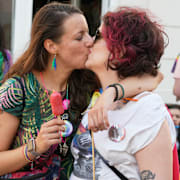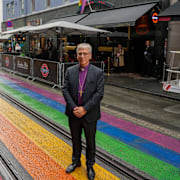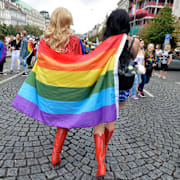
Jubelscener i hjärtat av Aten: ”Historiskt ögonblick”
Hbtq-rörelsen i Grekland gläds åt att Atens parlamentet beslutat att legalisera äktenskap och adoptioner för samkönade par. Sent i går kväll firade lyckliga folkskaror med regnbågsflaggor på det stora torget Syntagma utanför parlamentet, skriver den grekiska tidningen Kathimerini.
Den framstående hbtq-aktivisten Stella Belia kallar det ett historiskt ögonblick som många inte vågat tro skulle komma.
– Vi har väntat i åratal, säger hon enligt The Guardian.
Beslutet är det första i sitt slag för ett land med ortodoxt kristen majoritetsbefolkning.
bakgrund
Hbtq-rättigheter i Grekland
Wikipedia (en)
Lesbian, gay, bisexual, and transgender (LGBT) rights in Greece are regarded as the most advanced in Southeast Europe and among all the neighboring countries. Public opinion on homosexuality in Greece is generally regarded as culturally liberal. On 15 February 2024, same-sex marriage became legal while civil partnerships were recognised in 2015.
Both male and female types of same-sex sexual activity have been legal in Greece since 1951, and anti-discrimination laws in employment were enacted in 2005. Since then, anti-discrimination laws have been extended to other spheres, including gender identity. Hate speech and hate crime legislation is one of the most rigid and comprehensive in Europe. In 2015, civil unions (Greek: σύμφωνο συμβίωσης; cohabitation agreements) were legalised for same-sex couples, making households headed by same-sex couples eligible for many, but not all, of the legal protections and rights available to married opposite-sex couples. In 2017, transgender people were granted the right to have their gender identity recognized and to change their legal sex without having to undergo surgical alteration of their genitals in order to have key identity documents changed. In February 2018, a county court in Greece granted a non-binary person the right to a gender-neutral name. In May 2018, the Greek Parliament passed a law granting same-sex couples the right to foster care children.Gay culture is vibrant in the capital of Athens, particularly in the gay neighbourhood of Gazi, in Thessaloniki and some of the Greek islands. With Greece being one of Europe's most popular LGBT tourist destinations, many establishments catering for the LGBT community can be found in islands such as Mykonos, which is known worldwide for the gay and lesbian scene. There are four LGBT pride parades held annually, in Athens, Thessaloniki, Patras and Heraklion, the capital of the island of Crete. The largest of them, the Athens Pride, saw record participation in 2015, and the attendance of many public figures including the President of the Hellenic Parliament and the Mayor of Athens.
According to recent reports carried out by ILGA-Europe, which assesses LGBT rights in European countries, Greece achieved one of the highest improvements among the 49 countries in the legal and policy situation of LGBT people in the last decade, with an overall score of 57%.
Omni är politiskt obundna och oberoende. Vi strävar efter att ge fler perspektiv på nyheterna. Har du frågor eller synpunkter kring vår rapportering? Kontakta redaktionen



